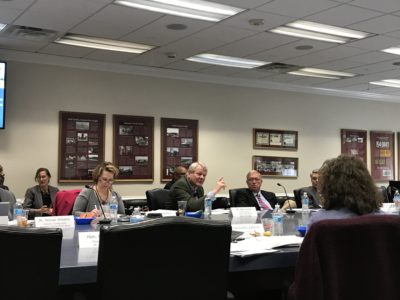

Has veto-proof become overmighty?
The question arises as the 2023 session of the General Assembly plods on through summertime with Republican lawmakers wielding their veto-proof majority. To pose the question with the use of “overmighty” — an antique word, still in the dictionary, meaning excessively powerful — is to attempt to expand the conventional legislature vs. governor analyses.
At stake is not simply the current power arrangement between Democratic Gov. Roy Cooper and Republicans with a supermajority in both Senate and House. Through the omnibus appropriations bill as well as separate measures, Republicans would exert legislative influence over education-related decision-making by increasing their appointees on an array of boards and commissions.
Under pending legislation, the General Assembly would restructure the State Board of Community Colleges. It provides for a 21-member board consisting of the lieutenant governor, state treasurer, labor commissioner, and 18 legislative appointees.
What’s more, the legislation gives precise instructions for choosing the president of the community college system. And it would require a president selected by the board to be confirmed by the legislature.
In a letter to the legislature, five former governors — three Democrats, two Republicans — objected to taking gubernatorial appointments away from boards of transportation, utility regulation, and coastal and wildlife resources. Their letter pointed especially to the dissonance the legislature would engender by leaving the governor, the state’s chief economic recruiter, without voices among those making policy for institutions critical to workforce development.
In another development-related provision, the Senate budget would direct $1.4 billion to NCInnovation, a nonprofit public-private partnership organization, designed to invest in university research that would lead to commercialization. On first glance, it has the look of a bold initiative.
The current board includes UNC President Peter Hans, four public university chancellors, and business leaders. In a distinct shift in governance, the legislation would have NCInnovation run with a 13-member board, a clear majority of eight members chosen by the General Assembly and five according to the organization’s bylaws, with state employees excluded. On second glance, the legislation has the look of more political influence and less expertise over a substantial funding stream.
Shortly after winning a legislative majority in the 2010 elections, Republican lawmakers removed the limit on charter schools, then set at 100. Now the state has 206 public charter schools with 138,352 students. The GOP education agenda has favored charters as an alternative to traditional public schools.
To advance that agenda, the General Assembly recently adopted a bill to create a Charter Schools Review Board, giving it more authority than the previous advisory board. Also, the 11-member review board would consist of eight voting members appointed by the legislature — surely intended to increase legislative influence and to offset more rigorous examination by the State Board of Education over which charters to grant and which schools to close.
Cooper has vetoed the charter review board bill, as well as related legislation that the governor points out would allow “more students to attend failing charter schools.” Both bills are back before the legislature.
In a somewhat similar fashion, a bill that has passed the House and sits in a Senate committee would add two legislature-influenced layers to the adoption of standard courses of study. It would create a Standard Course of Study Advisory Commission, with six appointees of the House, six of the Senate, and six of the governor, plus nonvoting representatives of the UNC system, the community college system, and the NC Chamber.
The State Board of Education could accept or reject the advisory commission’s recommendations. But under the legislation, the board would be required to submit a report to the Joint Legislative Education Oversight Committee before implementing any changes in a standard course of study.
This is yet another example of lawmakers moving to impose more scrutiny on public school authorities and educators — while, in contrast, freeing from similar oversight public-funded charter schools and private schools with voucher-subsidized students.
No doubt, most parents, students, and teachers care more about the day-to-day goings on in classrooms, gyms, cafeterias, and yellow buses than the hard-to-follow inner workings of the legislature and bureaucracy. And yet of course, a representative democracy demands attention to both process and policy; executive-legislative power struggles have a long history in Raleigh as well as Washington. The state and nation need competent executive leadership and knowledge-driven legislative craftsmanship — but neither side overmighty.




